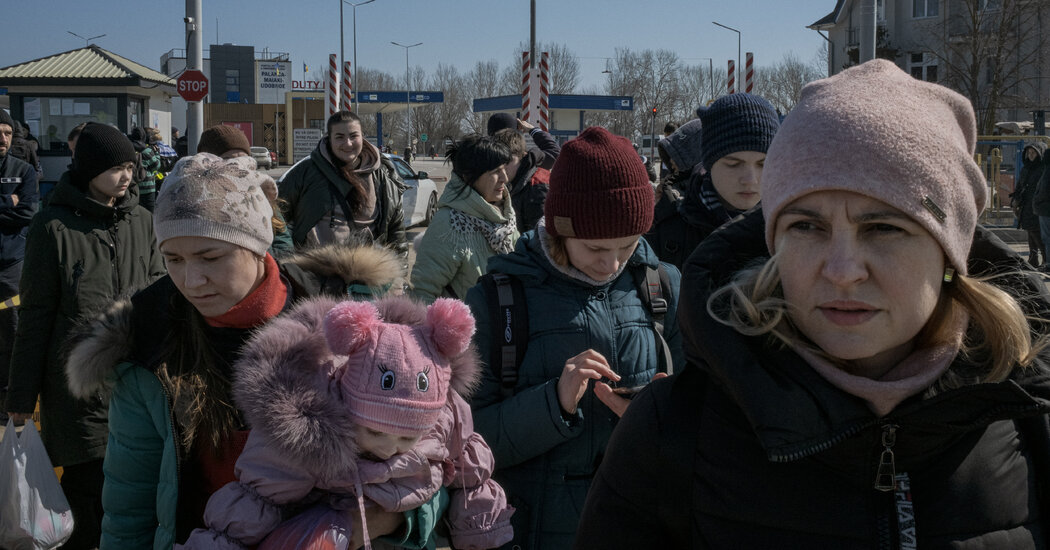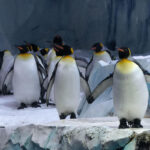
Nicolae Ciuca spent a lifetime on the battlefield before being voted in as prime minister of Romania four months ago. Yet even he did not imagine the need to spend millions of dollars for emergency production of iodide pills to help block radiation poisoning in case of a nuclear blast, or to raise military spending by 25 percent in a single year.
“We never thought we’d need to go back to the Cold War and consider potassium iodide again,” Mr. Ciuca, a retired general, said through a translator at Victoria Palace, the government’s headquarters in Bucharest. “We never expected this kind of war in the 21st century.”
Across the European Union and Britain, Russia’s invasion of Ukraine is reshaping spending priorities and forcing governments to prepare for threats thought to have been long buried — from a flood of European refugees to the possible use of chemical, biological and even nuclear weapons by a Russian leader who may feel backed into a corner.
The result is a sudden reshuffling of budgets as military spending, essentials like agriculture and energy, and humanitarian assistance are shoved to the front of the line, with other pressing needs like education and social services likely to be downgraded.
The most significant shift is in military spending. Germany’s turnabout is the most dramatic, with Chancellor Olaf Scholz’s promise to raise spending above 2 percent of the country’s economic output, a level not reached in more than three decades. The pledge included an immediate injection of 100 billion euros — $113 billion — into the country’s notoriously threadbare armed forces. As Mr. Scholz put it in his speech last month: “We need planes that fly, ships that sail and soldiers who are optimally equipped.”
The commitment is a watershed moment for a country that has sought to leave behind an aggressive military stance that contributed to two devastating world wars.
A wartime mind-set has also spread to sectors aside from defense. With prices soaring for oil, animal feed and fertilizer, Ireland introduced a “wartime tillage” program last week to amp up grain production, and created a National Fodder and Food Security Committee to manage threats to the food supply.
Farmers will be paid up to €400 for every additional 100-acre block that is planted with a cereal crop like barley, oats or wheat. Planting additional protein crops like peas and beans will earn a €300 subsidy.
“The illegal invasion in Ukraine has put our supply chains under enormous pressure,” Charlie McConalogue, the agriculture minister, said in announcing the $13.2 million package. Russia is the world’s largest supplier of wheat and with Ukraine accounts for nearly a quarter of total global exports.
Spain has been running down its supplies of corn, sunflower oil and some other produce that also come from Russia and Ukraine. “We’ve got stock available, but we need to make purchases in third countries,” Luis Planas, the agriculture minister, told a parliamentary committee.
Mr. Planas has asked the European Commission to ease some rules on Latin American farm imports, like genetically modified corn for animal feed from Argentina, to offset the lack of supply.
Extraordinarily high energy prices have also put intense pressure on governments to cut excise taxes or approve subsidies to ease the burden on families that can’t afford to heat every room in their home or fill their car’s gas tank.
Ireland reduced gasoline taxes, and approved an energy credit and a lump-sum payment for lower-income households. Germany announced tax breaks and a $330-per-person energy subsidy, which will end up costing the treasury $17.5 billion.
In Spain, the government agreed last week to defray the cost of gasoline in response to several days of strikes by truckers and fishermen, which left supermarkets without fresh supplies of some of their most basic items.
And in Britain, a cut in fuel taxes and support for poorer households will cost $3.2 billion.
The outlook is a change from October, when Rishi Sunak, Britain’s chancellor of the Exchequer, announced a budget for what he called an “economy fit for a new age of optimism,” with large increases in education, health and job training.
In his latest update to Parliament, Mr. Sunak warned that “we should be prepared for the economy and public finances to worsen potentially significantly,” as the country faces the biggest drop in living standards it has ever seen.
The energy tax relief was welcomed by the public, but the reduced revenues put even more pressure on governments that are already managing record high debt levels.
“The problem is that some countries have quite a big chunk of legacy debt — in Italy and France, it’s over 100 percent of gross domestic product,” said Lucrezia Reichlin, an economics professor at the London Business School, referring to the huge amounts spent to respond to the pandemic. “That is something which is very much new for the economic governance of the union.” European Union rules, which were temporarily suspended in 2020 because of the coronavirus, limit government debt to 60 percent of a country’s economic output.
And the demands on budgets are only increasing. European Union leaders said this month that the bill for new defense and energy spending could run as high as $2.2 trillion.
The Russia-Ukraine War and the Global Economy
For Germany, Europe’s largest economy, the costs are enormous. The coalition government has committed $1.7 billion to buy more liquefied natural gas and is investing nearly as much in building a permanent L.N.G. terminal and renting several floating ones in order to reduce its dependence on Russian fuel. At the same time, it has agreed to keep coal-fired power plants in reserve, even as it earmarked nearly $220 billion over the next four years to revive the country’s transition to renewable energy sources.
Germany’s energy supply is “at a historical turning point” as it moves away from Russian fuel, Deutsche Bank Research said in a market note last week. The energy links that have endured decades — “even during the hottest times of the Cold War — are to be loosened in the years to come.”
And then there is the cost of humanitarian aid to help settle the 3.7 million refugees from Ukraine who have streamed across the border. Estimates for housing, transporting, feeding and processing the flood of people have run as high as $30 billion in the first year alone.
Some countries have gone further. Poland and Romania have extended the same educational, health and social services to refugees that their own citizens enjoy.
Budgets are ultimately more than a mind-numbing compilation of numbers. They are the most meaningful declaration of a nation’s priorities, a reflection of its values.
The Russian invasion of Ukraine has transformed and clarified those.
The European Union agreed this month to “increase substantially defense expenditures” and “invest further in the capabilities necessary to conduct the full range of missions.”
The pledge includes countries that have fallen below NATO’s goal to spend a minimum of 2 percent of national output as well as countries that have exceeded the threshold. (The 27 members of the European Union and the 30 NATO members overlap but are not identical.)
A French parliamentary report published in February, a week before the invasion, concluded that in the event of large-scale conventional war, like one in Ukraine, an additional $44 billion to $66 billion over 12 years would be needed to bolster France’s military machine. President Emmanuel Macron has pledged a sharp increase in military spending — which is already $45 billion, more than 10 percent of the government’s total budget — if he wins the presidential election next month.
Kaja Kallas, the prime minister of Estonia, wrote in an essay published last week in The New York Times that “this year, we’ll spend 2.3 percent of G.D.P.; in the coming years, that will rise to 2.5 percent.”
Belgium, Italy, Poland, Latvia, Lithuania, Norway and Sweden — a militarily neutral country that is not a part of NATO — have also announced increases to their defense budgets.
“It’s our responsibility to take measures to protect ourselves,” said Mr. Ciuca, the Romanian prime minister. No one knows how long the war in Ukraine will continue, “but we have to reassess and adapt to what might happen in the future,” he added. “We have to be prepared for the unexpected.”
Raphael Minder contributed reporting from Madrid, Liz Alderman from Paris and Melissa Eddy from Berlin.




